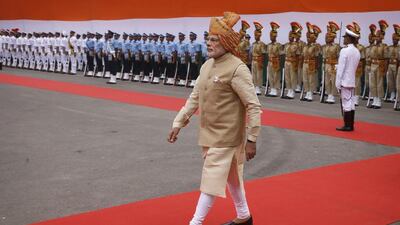Indian prime minister Narendra Modi’s visit to the UAE today and tomorrow has once again brought into focus India’s changing role in the Middle East, where it has significant stakes that are rising by the day.
This will be the first visit by an Indian prime minister since Indira Gandhi in 1981. Manmohan Singh was supposed to come here in March 2013, but the visit was cancelled at the last minute.
India’s policy towards the Middle East has often been viewed through the prism of Indian–Iranian relations. The international community, and the West in particular, has been obsessed with New Delhi’s ties to Tehran, while missing its much more substantive simultaneous engagement with Gulf Arab states and Israel.
India’s engagement with the UAE and other Arab countries has gained momentum in the past few years, even as Iran continued to hog the limelight.
India wants to secure energy supplies and consolidate economic and trade relations with the Gulf states, while the countries of the Gulf Cooperation Council (GCC) have adopted a “look east” policy which has allowed them to carve out a much more substantive relationship with India than in the past.
The economic dimension of India’s Gulf policy has become more pronounced in recent years. As a group, the GCC is India’s second-largest trading partner – the largest single origin of imports into India and the second largest destination for exports from India.
The UAE on its own was India’s third-largest trading partner in 2014-15, after the trade worth $60 billion (Dh220bn). The GCC countries remain a major destination for Indian investment, and India is making a concerted attempt to encourage GCC investment in India. India hopes that major GCC states such as Saudi Arabia, the UAE and Oman will participate in its planned infrastructure expansion.
The Gulf countries, meanwhile, are interested in human resources from India to help develop sectors as varied as information technology, construction, transport and services.
Energy is clearly the driving force in Gulf-Indian relations. The GCC countries supply 45 per cent of India’s petroleum; the Saudis are responsible for a quarter of those supplies, and Kuwait, Oman and the UAE are other major suppliers. Qatar remains India’s exclusive supplier of natural gas, providing 5 million tonnes each year.
The Iranian government’s decision to renege on some oil supply commitments, which follows India’s decision to vote against Tehran at the International Atomic Energy Agency, has also spurred New Delhi to diversify suppliers.
India’s trade and energy security is inextricably linked to the security of the Straits of Hormuz and Bab El Mandeb. With this in mind, the Indian navy regularly visits Gulf ports and conducts training exercises with several countries in this region.
Indian warships have also been deployed in the Gulf of Aden to carry out antipiracy patrols on the route usually followed by commercial vessels between Salalah in Oman and Aden in Yemen. The Gulf of Aden is a strategic choke point in the Indian Ocean and provides access to the Suez Canal, through which a sizeable portion of India’s trade flows.
Indians are the largest expatriate community in the GCC, numbering about 7 million. There are an estimated 2.6 million Indians in the UAE, or about 30 per cent of the total population, and India receives remittances worth tens of billions of dollars annually from its Gulf expatriates.
These remittances have contributed significantly to India’s economic resurgence. Due to concerns in recent years about the living and working conditions of Indian workers in some host countries, Dehli is pursuing manpower and labour agreements with several GCC member countries.
Mr Modi’s outreach to expatriates at the Dubai International Cricket Stadium tomorrow is certain to be the highlight of his visit.
Mr Modi’s visit underscores India’s continuing interest in this region. In common with the UAE, India wants a stable balance of power to emerge.
Harsh V Pant is a professor of international relations at King’s College London

